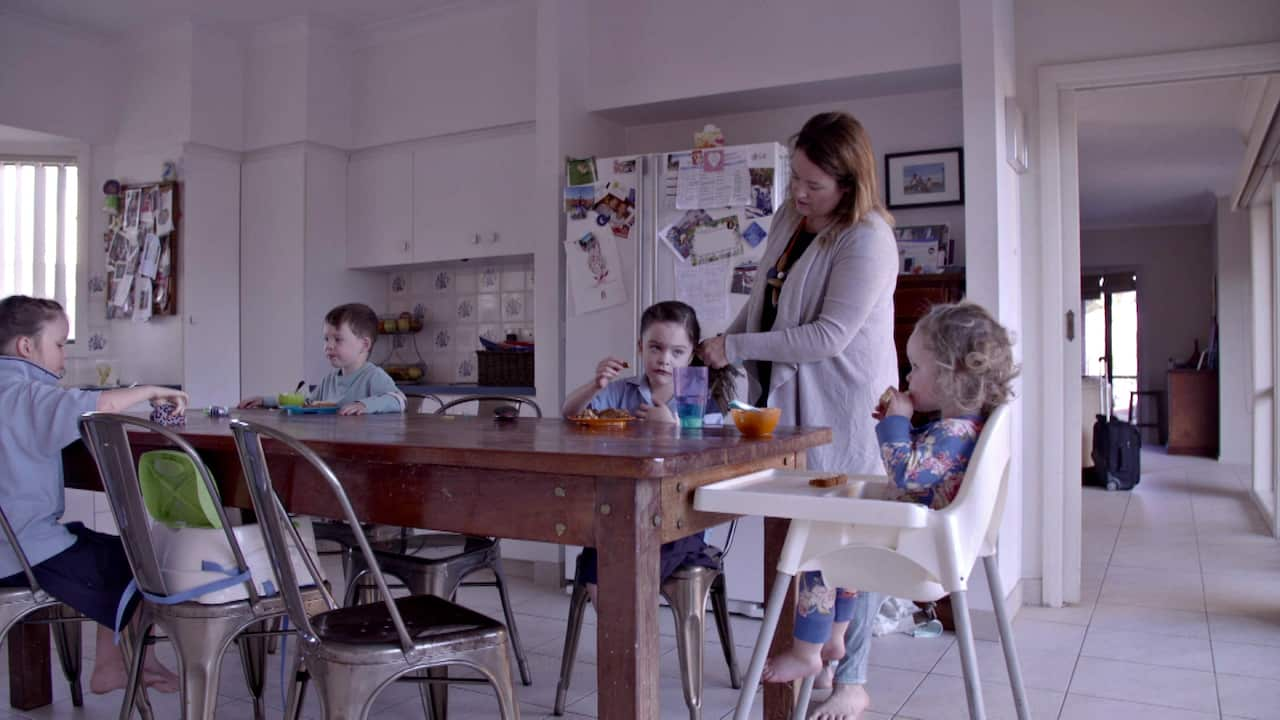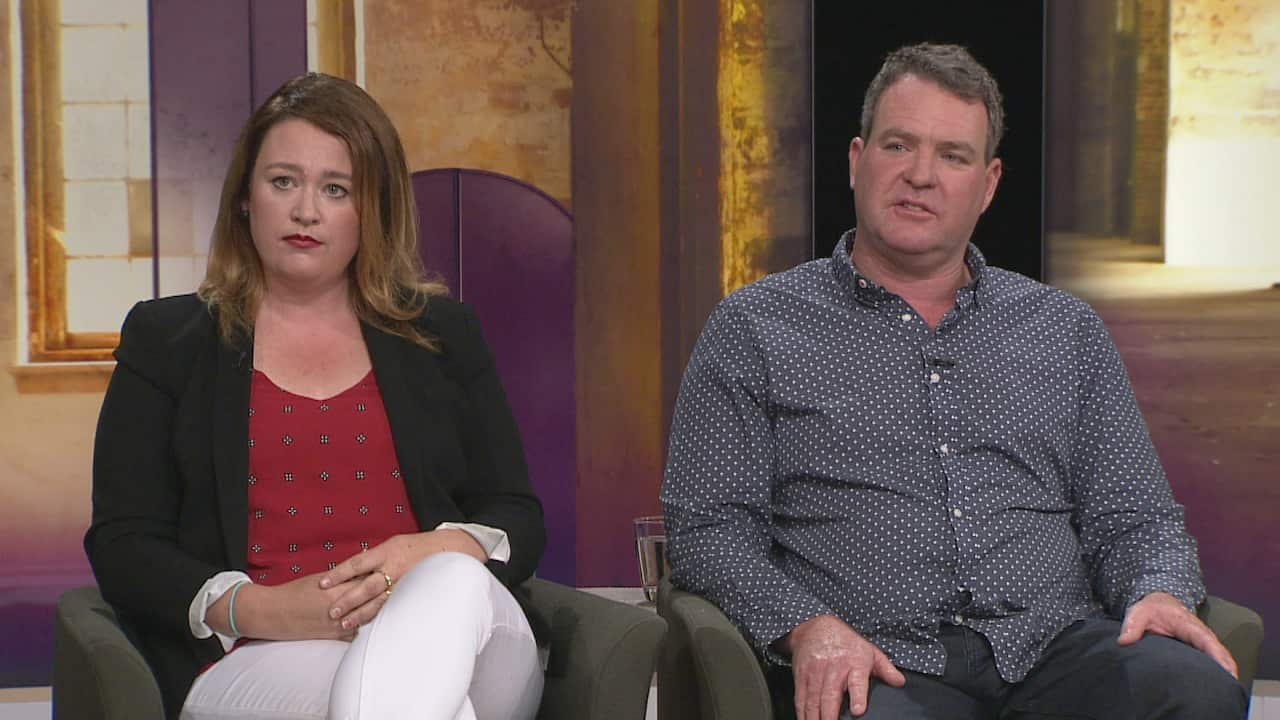Isabelle Cummins looks like any other six year old school girl. She enjoys trips to the park and playing on the playground equipment, chatting to people, and being with her family and her "beautiful" mum.
What is not immediately apparent is that Isabelle has an acquired brain injury as a result of a 10cm arachnoid cyst on her brain, which had to be surgically removed. Following the surgery she developed meningitis.
Isabelle went from a relaxed, happy little girl to a child who suffers from mood swings and has no control over her temper, how she feels and what she says.
"Sometimes she might love so greatly and then other times she can hate so greatly," says Isabelle's mother, Katie Cummins.
She's speaking with Insight's Jenny Brockie, as this week's show asks the question, how do families manage acquired brain injuries?
Other people judge her without knowing the full story and I struggle with that as a father, I really do.
Acquired brain injury (ABI) is a complex spectrum disorder that refers to any type of brain damage or neurological disruption that occurs after birth. It affects 700,000 Australians, or around 2 per cent of the population.
ABI is often referred to as a hidden disability because it is not always obvious, such as in Isabelle's case. However, it can result in personality and behavioural changes, and challenges when it comes to education, employment and other aspects of life.
Shortly after coming out of hospital Katie took Isabelle to the park not far from their house in north east Victoria. The walk there tired the little girl out, but once there she wanted to go on the slippery slide. There was a little girl sitting at the top of the slide who wasn't moving, and Isabelle said to the girl: "Just go down the f**king slide".
"I was mortified," says Katie. "I had to get up there, I was pregnant at the time so I had to pull her down off the slide and the parents were just thinking, 'oh, my goodness, what's this woman? She's pregnant, she's having another kid and she can't control that one?' So I dragged her home and all the other kids were crying as well because they didn't want to go home." These sorts of outbursts, which initially occurred on a daily basis, are now more sporadic, thanks to years of therapy and behaviour management.
These sorts of outbursts, which initially occurred on a daily basis, are now more sporadic, thanks to years of therapy and behaviour management.

Katie Cummins helps Isabelle and her other children get ready in the morning. Source: Insight/SBS
But the change to the family dynamic has been permanent.
Before the ABI, Isabelle was "the easy one", while her twin sister Grace was dominant. Now, Grace has had to take a back seat to her sister's moods.
"If [Isabelle's] great, she's good company, she's empathetic," her father Shane tells Insight.
"But if she's off her axis, whether she's tired, she's had a big day ... at school, or anything like that, everyone else in the house has to walk on eggshells around her because she just can't mediate that, going from really, really cold to really, really, hot. There's no luke warm."
Shane says one of the biggest struggles for him as a father has been dealing with other people's reactions to their daughter's unexplained meltdowns.
"Well from the outside she looks fine, she just looks like a normal six year old kid," he says.
"So if she's doing her lolly in the street, lots of people walk past and look at her. We've got a great group of friends and family who've learnt [about] Isabelle's challenges. But it is hard when other people... they judge her without knowing the full story and I struggle with that as a father, I really do." Initially Shane says he thought Isabelle would be back to her normal self within six months or a year. But after several months without improvement he realised Isabelle might never return to the way she was before the ABI.
Initially Shane says he thought Isabelle would be back to her normal self within six months or a year. But after several months without improvement he realised Isabelle might never return to the way she was before the ABI.

Katie and Shane Cummins talk about their daughter Isabelle's ABI on Insight. Source: Insight/SBS
"We had a meltdown, if you want to call it, in a pretty public place which really affected me because it was eight months after the operation and I just went home that day and I cried my eyes out," Shane says.
"I suppose I've been bottling it up inside thinking you know, hopefully there is light at the end of the tunnel. She'll get better, she'll get better, she'll get better, it will be another month she'll be better, another month, another six months, twelve months, it will be right.
"Well, it's just not, she's never going to be the way she was and that day I realised I'd lost my little girl. We've still got a beautiful daughter, don't get me wrong. I love talking about what's right about her, not what's wrong about her because she's got so much going for her, that kid."
Katie spends time every morning before school with Isabelle working on her reading and writing, and she and Shane have hired her a tutor, to help her reach her full potential. But they have no doubt she's going to have a marvellous future.
"She hasn't got an intellectual disability, she's got a brain injury, and that's what people don't realise," says Katie.
"She is bright, she's gorgeous, everyone who meets her is touched by her, and I just think her future is so bright.
"She's going to do something amazing. I don't know what it's going to be, she'll be helping people, she loves to talk so she might even be a counsellor or she'll do something fantastic, no doubt about it."
Insight looks at how families manage when a loved one sustains an acquired brain injury | Catch up online now:
[videocard video="886708291621"]
Share
Insight is Australia's leading forum for debate and powerful first-person stories offering a unique perspective on the way we live. Read more about Insight
Have a story or comment? Contact Us


